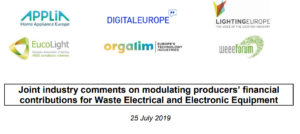 29/07/2019
29/07/2019Industry bodies ask for caution and coherence in eco-modulation of e-sector fees
Through a recast of its Waste legislation in 2018, the EU is promoting the idea that the financial contributions (or fees) that producers pay into organisations that implement the principle of extended producer responsibility (EPR), should be eco-modulated. In other words, the fees paid towards management of electronic waste should be modulated to reward producers for their efforts in designing their products to mitigate their impact on the environment (bonus) or to provide disincentives for marketing less environmentally-friendly products (malus). Eco-modulation of fees is considered an instrument to put the Circular Economy into practice.
The European Commission is expected to publish guidelines on the eco-modulation of fees in order to assist Member States in the transposition of EU legislation. ORGALIM, APPLiA, DIGITALEUROPE, EucoLight, LightingEurope and the WEEE Forum, representative of the industry of manufacturers of electrical and electronic equipment and of electronic waste collection organisations, have laid down a set of twelve high-level recommendations to guarantee a successful implementation. They believe that the introduction of eco-modulated fee schemes risks making matters worse by creating an additional layer of complexity, if the market is not effectively surveyed and if the criteria underpinning the eco-modulation are not harmonised. Click here to download a copy of the joint industry paper.
“We believe that eco-modulation of fees that producers pay into the EPR organisations is one of the instruments that will usher in the Circular Economy, provided that the criteria underpinning the modulation of fees are harmonised at EU level and coherent with EU legislation and international standards”, says Pascal Leroy, Director General of the WEEE Forum, one of the signatories of the paper. “Furthermore, we remind policymakers that online free-riding, the phenomenon whereby online sellers typically choose not to register and not to undertake take back of e-waste, or not to pay for collection and reprocessing of e-waste, is rife in the EEE sector. Free-riding imposes an unfair cost on other, compliant producers and retailers, distorts the market, makes compliant companies less competitive and results in an overstatement of WEEE collection rates making this an urgent issue that should be addressed as a matter of priority.”
About
The WEEE Forum a.i.s.b.l. is an international association representing 51 producer responsibility organisations across the globe. Together with our members, we are at the forefront of turning the extended producer responsibility principle into an effective electronic waste management policy approach through our combined knowledge of the technical, business and operational aspects of collection, logistics, de-pollution, processing, preparing for reuse and reporting of e-waste. Our mission is to be the world’s foremost e-waste competence centre excelling in the implementation of the circularity principle.
Transparency Register ID 702397445-73.
Copyright 2019 All Rights Reserved
Contact
BluePoint conference and
business centre
Boulevard Auguste Reyerslaan 80
B-1030 Brussels
Belgium
Newsletter
Subscribe to our mailing list to get the updates to your email inbox.